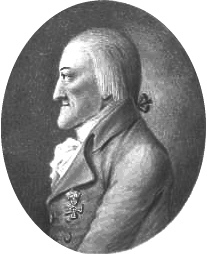Johann Amadeus Francis de Paula, Baron of Thugut
| Johann Amadeus Franz von Thugut | |
|---|---|

Portrait by J. A. Ecker
|
|
| State Chancellor of the Habsburg Monarchy | |
|
In office 27 March 1793 – 16 January 1801 |
|
| Monarch | Francis II |
| Preceded by | Philipp von Cobenzl |
| Succeeded by | Ferdinand von Trauttmansdorff (acting) |
| Personal details | |
| Born |
31 March 1736 Linz, Upper Austria |
| Died | 28 May 1818 (aged 82) Vienna |
| Religion | Catholic |
Johann Amadeus Franz de Paula Freiherr von Thugut (24 May 1736 – 28 May 1818) was an Austrian diplomat.
He was born in Linz. His origin and name have been the subject of legends more or less malicious and probably the inventions of enemies. It has been said that the correct form of his name was Thunichtgut, or Thenitguet ("do no good"), and was altered to Thugut ("do good") by Maria Theresa. Tunicotta has been given as a variation. But Thugut was the name of his great-grandfather, who belonged to Budweis in southern Bohemia. He was the legitimate son of Johann Thugut, an army paymaster, who married Eva Maria Mösbauer, daughter of a miller near Vienna. The paymaster, who died about 1760, left his widow and children in distress, and Maria Theresa took charge of them.
Johann Amadeus was sent to the school of Oriental languages. He entered the Austrian foreign office as an interpreter and was appointed dragoman to the embassy at Constantinople. In 1769 he was appointed chargé d'affaires, and in that capacity secured a grant of money and a promise of the territory of Little Wallachia from the Turks during the negotiations connected with the first partition of Poland.
In 1771 he was appointed internuncio at Constantinople and was actively engaged, under the direction of Prince Kaunitz, in all the diplomacy of Austria in Turkey and Poland until he secured the cession of the Bukovina on 7 May 1775. During these years Thugut was engaged in a mean intrigue. His salary as dragoman was small, and his needs great. He therefore agreed to receive a pension of 13,000 livres, a brevet of lieutenant-colonel, and a promise of a safe refuge in case of necessity from the king of France, Louis XV. The condition on which the pension was granted was that he took advantage of his position as an Austrian official to render secret services to France. The only excuses to be made for him are that such hidden arrangements were not uncommon before and in his time, and that as a matter of fact he never did render France any real service, or betray his masters at Vienna. Yet the terror of discovery disturbed him at several periods of his life, and when Louis XV died in 1774 he showed a strong disposition to take refuge in France, and would have done so if Louis XVI would have given him a promise of employment. His pension was continued.
...
Wikipedia
